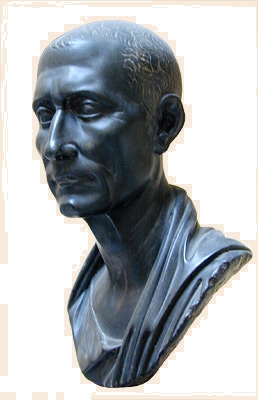

Rome was founded c. 500 bc. By 200 bc, it ruled most Italy, and in 150 bc, it conquered Carthage, the greatest power of the western Mediterranean at the time. By 150 bc, only three cities had over 100,000 people: Antioch, Alexandria, and Rome. By 44 bc, Rome would rule them all.
 When Julius Caeser was assassinated in 44 bc (pretty much as Shakespeare described it!), that ended the vigorous Roman Republic. His adopted heir, calling himself Augustus Caesar, became first emperor. The Roman Empire would reach its greatest extent in 116 ad under the Emperor Trajan.
When Julius Caeser was assassinated in 44 bc (pretty much as Shakespeare described it!), that ended the vigorous Roman Republic. His adopted heir, calling himself Augustus Caesar, became first emperor. The Roman Empire would reach its greatest extent in 116 ad under the Emperor Trajan. As you can imagine, the best minds of Rome were absorbed into politics, war, and economics. Few had the luxury of abstract philosophizing. Besides which, the Greeks had done that already, and look how far it got them: Quite a number of Greek philosophers wound up as Roman slaves, tutoring the youth of Roman aristocracy!
In this atmosphere, we find a powerful renewed interest, among the rich and poor alike, in religion. The old religion of Rome was given lip service, to be sure. But most saw the gods as little more than stories to scare naughty children (except when the adults themselves got frightened!). They were looking for comfort in uncertain times, and they found philosophy too dry. Many different cults -- of the Great Mother, of Dionysus, of Isis from Egypt, Mithra from Persia, Baal from Syria, Yahweh from Palestine -- became popular. Eventually, the Judaic sect we now call Christianity would prevail.
(To find out more about the early Jews and their beliefs, click here!)
Why talk about religions and religious philosophies in a book on the history of psychology? There are actually a number of reasons. First, religion, philosophy, science, and psychology all come from the same human roots: We have a strong desire, even need, to understand the nature of the universe, our place in that universe, and the meaning of our lives. Religion included answers to these issues that have been psychologically satisfying as well as socially and politically powerful. Philosophy began separating from religion in the Greek and Roman times, and yet the great majority of people stuck with religion for their answers. In the renaissance and enlightenment, science began to separate from both religion and philosophy, and still the great majority remained loyal to religious dogma. And throughout much of history, religions have often taken a strongly anti-philosophical and anti-scientific position. Psychology inherits some of these issues, even into the modern era. It is valuable to any student of the history of philosophy, science, and psychology to understand the roots of religious belief and the power of those beliefs.
No comments:
Post a Comment